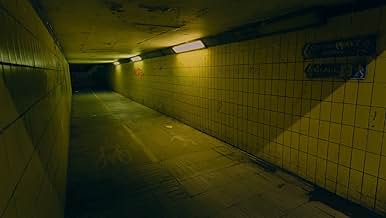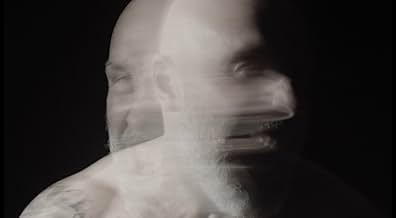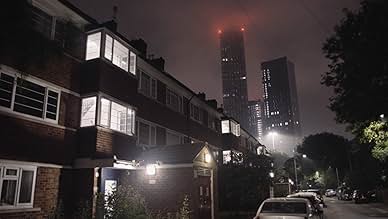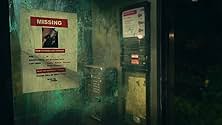This multi award-winning British feature film follows a grieving ex-English teacher as he takes us on a personal journey through Broken Britain under Margaret Thatcher in the 1980s, John Maj... Read allThis multi award-winning British feature film follows a grieving ex-English teacher as he takes us on a personal journey through Broken Britain under Margaret Thatcher in the 1980s, John Major in the 1990s and Boris Johnson in the 2020s.This multi award-winning British feature film follows a grieving ex-English teacher as he takes us on a personal journey through Broken Britain under Margaret Thatcher in the 1980s, John Major in the 1990s and Boris Johnson in the 2020s.
- Director
- Writer
- All cast & crew
- Production, box office & more at IMDbPro
Featured reviews
This is a difficult film to examine since it appears to defy interpretation, and even on interpretation I feel as though there is a little something for everybody to take away from this unique indie arthouse attack.
The entire sensation is channelled through a fascinating collection of pieces to camera, ranging from the painfully poignant Reuben Clarke recounting his abuse to Wendy Patterson's frustratingly soul-crushing authority, who is a perfect portrayal of the robotic kafka-esque bureaucrats who care not for creativity and freedom.
One of the few films that genuinely achieves the dreamy feeling that many claim to have. The slowness of the introduction, the bridging of the narrative as it fades in and out, and the impression the camera provides us as the viewer's eyes, with no control over where you're going all set the setting for a mesmerizingly bizarre experience that can only be compared to a dream. Similarly, dreams may be interpreted in a variety of ways.
I'd recommend giving this a watch if you are able to find it outside of Manchester.
The entire sensation is channelled through a fascinating collection of pieces to camera, ranging from the painfully poignant Reuben Clarke recounting his abuse to Wendy Patterson's frustratingly soul-crushing authority, who is a perfect portrayal of the robotic kafka-esque bureaucrats who care not for creativity and freedom.
One of the few films that genuinely achieves the dreamy feeling that many claim to have. The slowness of the introduction, the bridging of the narrative as it fades in and out, and the impression the camera provides us as the viewer's eyes, with no control over where you're going all set the setting for a mesmerizingly bizarre experience that can only be compared to a dream. Similarly, dreams may be interpreted in a variety of ways.
I'd recommend giving this a watch if you are able to find it outside of Manchester.
Like our own movie About Some Senseless Happening, I think if this movie had been made in the 1970s or earlier, it would have been banned and lost for decades without any cinema buff knowing where it went. The fable-like experimentalism of Mirage and the unvarnished, synthetically realist documentary are the only two elements that distinguish this as a standout because they dissect what makes anything meaningful and the conventions we are used to in contemporary storytelling and the narrative.
With static images emulating interviews with women from the protagonists' former lives and various straight long speeches to the camera, we follow all of the film's characters in a fashion that many would describe as barely "cinematic." All this is linked to the tale-like qualities noted earlier, with a scene reminiscent of the fable and the calming and omnipotent narrator acting as liberating and reflection points for the curiosity as a whole. It seems that there are many speakers talking to camera about speech.
However, I believe it is a reductive and unreasonable standard to use in this particular instance. What "Nobody Loves You and You Don't Deserve to Exist" gets right are its universal truths about family, society, art, and purpose. People in this story are paradoxical in that they can both hurt and help those around them, demonstrating the sick and twisted nature that this lack of personal purpose in favour of sins brings onto those around them.
When we look at you in reflection? Is it the version of ourselves we want to see, or do we feel like we want to see it?
With static images emulating interviews with women from the protagonists' former lives and various straight long speeches to the camera, we follow all of the film's characters in a fashion that many would describe as barely "cinematic." All this is linked to the tale-like qualities noted earlier, with a scene reminiscent of the fable and the calming and omnipotent narrator acting as liberating and reflection points for the curiosity as a whole. It seems that there are many speakers talking to camera about speech.
However, I believe it is a reductive and unreasonable standard to use in this particular instance. What "Nobody Loves You and You Don't Deserve to Exist" gets right are its universal truths about family, society, art, and purpose. People in this story are paradoxical in that they can both hurt and help those around them, demonstrating the sick and twisted nature that this lack of personal purpose in favour of sins brings onto those around them.
When we look at you in reflection? Is it the version of ourselves we want to see, or do we feel like we want to see it?
This movie was sent to me by a kindly stranger 3000 milies all the way in England. That is has so few letterboxd notes due to what I can only assume is a criminal lack of availability it's a shame because it was one of the most humane depictions of life I've ever seen on film, transcending all taboos and conventional filmmaking. (Going for a more experimental, maybe even tamed anarchy filming approach) that delivers a strong meloncolic but also somewhat courageous. What I noticed in the cinematography and my understanding of some of the dialogue was that the script of the film is taken from and heavily inspired by the Russian works of authors such as Dostoevsky, Chekov and Goncharov, with standout influences here being; Crimes and Punishment, A Nervous Breakdown, Notes from Underground and Oblomov to list just a few. First, similar to these works, this movie emphasized to me that people's actions and intentions can be the result of very complex and often deeply hidden thoughts, experiences, beliefs and feelings.
Both the main character of the film and the audience undergo an examination of conscience. As a practicing Muslim, I am familiar with this concept through the application of Islamic Muhasaba, but after reviewing it and comparing it to Crime and Punishment, I was left with a new understanding of how we sin, why we sin, and the consequences. I had to watch this twice to get to terms with this, as on the surface one can easily be lost in the layers this film has to offer, but Jack's dealing what I see as a deeply spiritual and psychological crisis (that those around him can't understand) makes for a more interesting approach to character study, that instead of building up his own values he sees glory lost and like an anti-message on Henry Vaughan's 'The Retreat' or Wordsworth's Immortality Ode, he seeks to transcend his own image to something abstract and beyond the negative experience of society.
The way this movie reintroduced me to English culture is what intrigued me the most, and in light of the European literature I've read over the years, I can say that presents a new fascination on multiple levels that communicates a 'New England', a weeping and tortured England, a land of high poverty , low art. I was so captivated on so many levels; The language they spoke to me seemed even foreign compared to the generally depilated language or my unconscious prejudices about the English character. How can I interpret what these conservatives are doing to subjugate based on what I see on the screen? Are there other people at this level? For others, this can lead to fantastic experiences in this distinctive genre of English filmmaking.
I must also mention that the filmmaker who offered me the chance to see this film exuded an infectious and fervent excitement, the likes of which I have never before encountered, with no sales or profit motives, but a want to share and connect with others.
Cinematography, with its lyrical soundtrack, gave each inanimate element the allure of a national icon and gave each shot a sense of urgency and resting beauty. The movie has the feel of something that will grow in importance over time; perhaps twenty years from now people will appreciate it for its hidden beauty and the lessons it contains; For now, I'm just grateful to be one of the lucky few who saw it.
Both the main character of the film and the audience undergo an examination of conscience. As a practicing Muslim, I am familiar with this concept through the application of Islamic Muhasaba, but after reviewing it and comparing it to Crime and Punishment, I was left with a new understanding of how we sin, why we sin, and the consequences. I had to watch this twice to get to terms with this, as on the surface one can easily be lost in the layers this film has to offer, but Jack's dealing what I see as a deeply spiritual and psychological crisis (that those around him can't understand) makes for a more interesting approach to character study, that instead of building up his own values he sees glory lost and like an anti-message on Henry Vaughan's 'The Retreat' or Wordsworth's Immortality Ode, he seeks to transcend his own image to something abstract and beyond the negative experience of society.
The way this movie reintroduced me to English culture is what intrigued me the most, and in light of the European literature I've read over the years, I can say that presents a new fascination on multiple levels that communicates a 'New England', a weeping and tortured England, a land of high poverty , low art. I was so captivated on so many levels; The language they spoke to me seemed even foreign compared to the generally depilated language or my unconscious prejudices about the English character. How can I interpret what these conservatives are doing to subjugate based on what I see on the screen? Are there other people at this level? For others, this can lead to fantastic experiences in this distinctive genre of English filmmaking.
I must also mention that the filmmaker who offered me the chance to see this film exuded an infectious and fervent excitement, the likes of which I have never before encountered, with no sales or profit motives, but a want to share and connect with others.
Cinematography, with its lyrical soundtrack, gave each inanimate element the allure of a national icon and gave each shot a sense of urgency and resting beauty. The movie has the feel of something that will grow in importance over time; perhaps twenty years from now people will appreciate it for its hidden beauty and the lessons it contains; For now, I'm just grateful to be one of the lucky few who saw it.
First and foremost, I'd like to thank Jack Clarke, one of the producers who found me and provided me with a private link to this film from the comfort of my own home.
As Vladimir Lenin once said: "art belongs to the people. It must leave its deepest roots in the very thick of the working masses. It should be understood by those masses and loved by them." This film, I believe, must be understood as the filmmakers' attempt to create an expression of their collective voices and ideas that acts in opposition to the current status quo. Unlike Soviet Realism, this film does not project a positive image of the United Kingdom; in fact, it is so unique in its realist social commentary and performances from its true-to-life characters, but it has a very auteurist, heavily stylized visual and editing style.
What is presented is a loss of identity, not just in a poor man's life, but in the collective cultural identity of the UK, with the decline of the Church and Christian ideals in the place of toxic progressivism that sees no end to its insanity and path to collective greed and corruption. Despite the fact that the UK suffers so severely, I believe the director is demonstrating how ignorant and passive its people are to this, no matter how obvious, and the lead performance of Jack embodies this message and idea.
This is not a perfect film by any means, and some of the young adult Jack's performance felt too long, but it really depends on what you consider to be a 'film.' I will make the point that this is a perfect example of autuership, outsider filmmaking, and the early examples of new film movements; Is this the first of its kind in a new era of anti-establishment working-class British filmmaking? Time will only tell.
Important cinematic voices like this are to be encouraged and given more opportunities to express themselves, as they only appear once or twice every generation.
As Vladimir Lenin once said: "art belongs to the people. It must leave its deepest roots in the very thick of the working masses. It should be understood by those masses and loved by them." This film, I believe, must be understood as the filmmakers' attempt to create an expression of their collective voices and ideas that acts in opposition to the current status quo. Unlike Soviet Realism, this film does not project a positive image of the United Kingdom; in fact, it is so unique in its realist social commentary and performances from its true-to-life characters, but it has a very auteurist, heavily stylized visual and editing style.
What is presented is a loss of identity, not just in a poor man's life, but in the collective cultural identity of the UK, with the decline of the Church and Christian ideals in the place of toxic progressivism that sees no end to its insanity and path to collective greed and corruption. Despite the fact that the UK suffers so severely, I believe the director is demonstrating how ignorant and passive its people are to this, no matter how obvious, and the lead performance of Jack embodies this message and idea.
This is not a perfect film by any means, and some of the young adult Jack's performance felt too long, but it really depends on what you consider to be a 'film.' I will make the point that this is a perfect example of autuership, outsider filmmaking, and the early examples of new film movements; Is this the first of its kind in a new era of anti-establishment working-class British filmmaking? Time will only tell.
Important cinematic voices like this are to be encouraged and given more opportunities to express themselves, as they only appear once or twice every generation.
This is a mysterious, monologue-fuelled masterpiece filmed on a shoestring in the heart of gritty Manchester and beyond. Great writing, visuals, direction and performances, all round.
Details
- Release date
- Country of origin
- Official site
- Language
- Filming locations
- Production company
- See more company credits at IMDbPro
- Runtime
- 1h 38m(98 min)
- Color
Contribute to this page
Suggest an edit or add missing content












